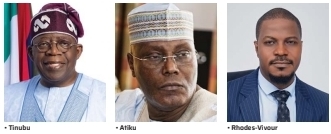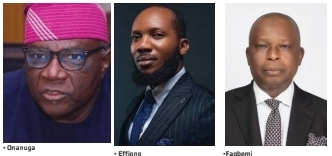- Atiku, ADC, Amnesty International, Inibehe Effiong, RhodesVivour, others condemn move as “reckless”, “immoral”, and “an abuse of power”
President Bola Ahmed Tinubu’s decision to grant presidential pardons and clemency to 175 individuals—including convicted drug traffickers, murderers, and corrupt public officials—has triggered nationwide outrage. From opposition leaders to civil society groups and human rights advocates, voices across Nigeria have denounced the move as a reckless abuse of power that undermines the justice system and emboldens criminality.
Presidency: “Mercy Guided by Justice”
The Presidency, through Bayo Onanuga, Special Adviser to the President on Information and Strategy, said the clemency extended to a broad range of convicts, including the late na tionalist Herbert Macaulay, the late Major General Mamman Vatsa, Maryam Sanda (convicted for killing her husband), and members of the Ogoni Nine led by Ken Saro-Wiwa. Onanuga said the gesture was based on “remorse, good conduct, old age, or vocational rehabilitation,” following recommendations by the Presidential Advisory Committee on the Prerogative of Mercy, chaired by Attorney-General Lateef Fagbemi (SAN). According to him, in all, the Presidential Advisory Committee recommended pardon for two inmates, 15 former convicts, 11 of whom have died.
“The committee recommended clemency for 82 inmates and commutation of sentences for 65 inmates. Seven inmates on death row also benefited from the Presidential reprieve. The committee recommended that the President should commute their death sentences to life imprisonment. “Prince Fagbemi presented the committee’s report at the Council of State meeting, chaired by President Bola Ahmed Tinubu”, he stated.

“President Tinubu granted clemency based on verifiable reports of remorse and rehabilitation,” — Bayo Onanuga, Presidential Adviser
But this explanation has done little to calm public anger. Critics insist that granting clemency to convicts of drug trafficking, homicide, and corruption sends a wrong message to both citizens and law enforcement.
ADC: “A National Disgrace”
The African Democratic Congress (ADC) called the decision “pathetic and a national disgrace.” In a statement by its National Publicity Secretary, Bolaji Abdullahi, the party accused the government of “undermining Nigeria’s anti-drug campaign and damaging our international credibility.” “It amounts to a most irresponsible abuse of presidential power,” the ADC said. “The pardons mock the sacrifices of NDLEA officers who risk their lives daily combating the drug scourge.” The party said the move portrays Nigeria “as a haven for traffickers under a government tolerant of drug criminals.”
Atiku: “An Affront to Justice and Morality”
Former Vice President and 2023 PDP presidential candidate Atiku Abubakar described the pardons as “a shocking and indefensible act” that weakens faith in the rule of law. “Extending clemency to individuals convicted of grave crimes such as drug trafficking, kidnapping, murder, and corruption diminishes the sanctity of justice,” Atiku said. He argued that nearly 30 percent of the beneficiaries were drug offenders — “an insult to the countless families destroyed by narcotics.” Atiku added that the decision “raises moral irony,” alluding to past controversies over Tinubu’s alleged involvement in a U.S. drug forfeiture case. “A presidential pardon should symbolise restitution and moral reform. Instead, this act mocks justice and emboldens lawlessness,” he said.

Amnesty International: “A Setback for Victims’ Rights”
Amnesty International Nigeria expressed concern that the list includes individuals convicted of human rights violations. Country Director Isa Sanusi warned that the action “prioritises perpetrators over victims,” potentially denying families justice and closure. “This decision undermines the rule of law and entrenches impunity,” Amnesty said. “President Tinubu should reconsider and uphold the rights of victims and their families.”
Effiong: “A Free Pass for Hardened Criminals”
Human rights lawyer Inibehe Effiong described the pardon as “a dangerous precedent” that will embolden criminals and weaken the justice system. Speaking on Channels Television’s The Morning Brief, he said: “I find it curious that the President has chosen to pardon individuals convicted of drug trafficking and homicide—some barely two years into their sentences. What message does this send to NDLEA officers risking their lives?” Effiong condemned the inclusion of Maryam Sanda, calling it “morally indefensible.” “If the President intends to become the saviour of hardened criminals, he might as well open the gates of Kirikiri,” he said.
Rhodes-Vivour: “Drug Barons with Powerful Connections”
Gbadebo Rhodes-Vivour, Labour Party chieftain and 2023 Lagos governorship candidate, said the move exposes the government’s misplaced priorities. “The drug crisis ravaging Lagos youths is a tragedy. Those pardoned were not innocent mules—they were dealers profiting from the misery of our people,” he said. “Why are these particular criminals the priority of the state while ordinary Nigerians languish in jail for lesser offences?”
Public Anger Mounts
Across social media, the outrage continues to swell. Citizens, lawyers, and civic groups have branded the action “tonedeaf” and “morally bankrupt.” Many have called on the National Assembly to review the constitutional process for presidential clemency to prevent future abuse and ensure transparency.
“This pardon is an insult to every Nigerian who still believes crime should have consequences,” — Social media user comment trending on X (formerly Twitter)
As the controversy deepens, President Tinubu faces growing pressure to explain how compassion for convicts aligns with his administration’s claims of being tough on crime.





